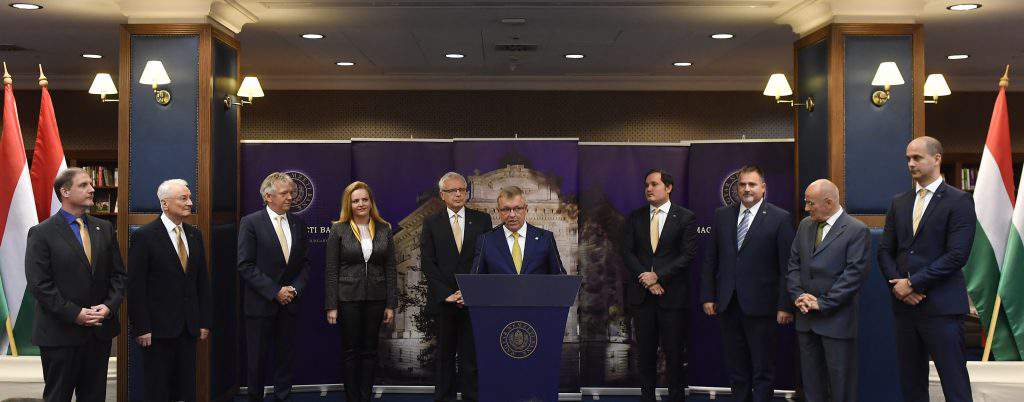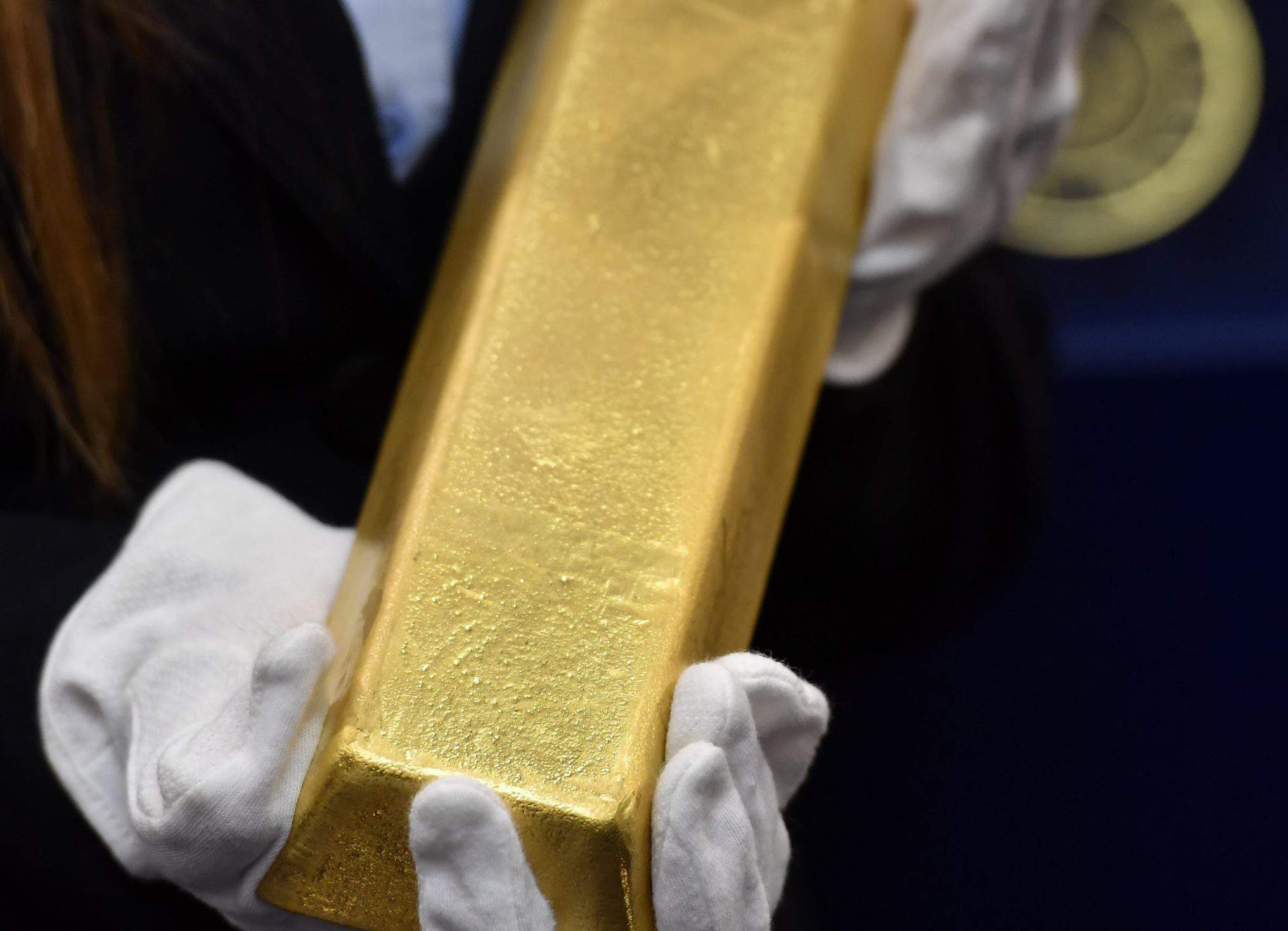Hungary’s gold reserves increase tenfold, reaching historical levels!
Budapest, 2018. október 16. Aranyrúd a Magyar Nemzeti Bank (MNB) sajtótájékoztatóján a jegybank székházában 2018. október 16-án. Az MNB tízszeresére növelte Magyarország aranytartalékát, a döntéssel 2018 októberében a jegybank nemesfém állománya a korábbi 3,1 tonnáról 31,5 tonnára emelkedett, melynek értéke mintegy 1,24 milliárd dollár. MTI Fotó: Illyés Tibor
Taking into account the country’s long-term national and economic policy strategy objectives, the National Bank of Hungary’s (NBH – Magyar Nemzeti Bank) Monetary Council has decided to increase Hungary’s gold reserves significantly. As a result, the stock of precious metal rose from 3.1 tons to 31.5 tons, i.e. by a factor of ten, in October 2018. The National Bank of Hungary purchased gold for the first time since 1986. Following the significant increase in physical form, the stock of gold reserves has already been transported to Hungary.
Holding precious metal within the country is consistent with international trends, enhances financial stability and may strengthen market confidence in the Hungarian economy. Preserving its historical role, gold continues to be one of the safest assets in the world, which enhances stability and confidence even under normal market circumstances.
The 31.5 tons of gold reserves, worth some USD 1.24 billion at current market prices, has reached a historical level already available for Hungary at the time of the ‘gold train’.
The ratio of gold reserves to Hungary’s total international reserves has risen to 4.4 per cent, which corresponds to the average of non-euro area Central and Eastern European countries.
The importance of gold in national and economic policy strategy has increased recently, with both holding precious metal within the country and increasing its stock being part of a dominant international trend. Following this trend and based on the Magyar Nemzeti Bank’s strategic decision, Hungary’s gold reserves were increased to 31.5 tons. The gold reserves were increased and transported in physical form to Hungary in the first part of October 2018.
Increasing the stock of gold reserves and transporting it to Hungary have been important steps from an economic history perspective. The National Bank of Hungary has held gold reserves since its foundation in 2014. However, the amount of reserves has fluctuated widely over the decades, depending on the objectives of holding them. The stock of gold reserves had increased until World War II. Towards the end of the war, the NBH rescued gold bars and coins weighing some 30 tons on its legendary ‘gold train’ to Spital am Pyhrn in Austria. Once the war was over, the total amount of gold returned to the country, providing coverage for the introduction of Hungary’s new currency, the forint, thereby supporting financial consolidation and the stabilisation of the post-war Hungarian economy.
At the end of the 1980s, Hungary’s gold reserves fluctuated around 40-50 tons, driven by short-term investment goals, then they fell to barely 3.1 tons during the political transition (i.e. between 1989 and 1992) following the decision of the Bank’s management of the time, and remained at that level until the end of September 2018.
With the NBH’s latest decision, however, by October 2018 the stock of gold reserves, at 31.5 tons, rose back to its level during the 1946 stabilisation period. The amount of money spent on the 2,300 gold bars has not been disclosed yet, although a rough estimate can be drawn from recent gold rates.

Photo: MTI
Central banks hold gold reserves for short-term investment and/or long-term stability purposes. The National Bank of Hungary’s latest decision was driven by stability objectives; there were no investment considerations behind holding gold reserves. In normal circumstances, gold has a confidence-building feature, i.e. it may play a stabilising role and act as a major line of defence under extreme market conditions or in times of structural changes in the international financial system or deep geopolitical crises. In addition, gold continues to be one of the safest assets, which can be related to individual properties such as the limited supply of physical precious metal, which is not linked with credit or counterparty risk, given that gold is not a claim on a specific counterparty or country.
In recent years, an increasing number of countries have decided to again designate a dominant role to this precious metal functioning as a traditional reserve asset and to increase their gold reserves. Poland, for example, has followed this path recently, despite the fact that the country had previously held one of the largest gold reserves in the region.
In increasing Hungary’s gold reserves to 31.5 tons, the NBH took into account the role this precious metal plays in central bank reserves both internationally and regionally.
This meant that in Hungary the ratio of gold reserves to total international reserves rose to 4.4 per cent, corresponding to the average of Central and Eastern Europe. With this step, Hungary moved from the bottom of the international ranking list to the middle, both in terms of the size of gold reserves and their ratio.
On the occasion of the announcement, the National Bank of Hungary published a ‘gold book’, which provides an insight into key periods such as the centuries of gold currency, the rescue of Hungary’s national treasure on the gold train or the recent return of the country’s gold reserves.
Hungary wants to keep up the pace with international norms of acquiring precious metals such as gold and silver to strengthen their positioning in the market. MNB tried to justify this purchase by bringing up Hungary’s extensive history for being known as one of the world’s largest gold producers several centuries ago, although analysts describe this as a political move to assert dominance in the region.
As we wrote on March, the National Bank of Hungary announced the return of the country’s 100,000 ounces of gold reserves to Budapest from London, read more HERE.
Source: National Bank of Hungary
please make a donation here
Hot news
Warning: Traffic restrictions in Budapest today due to mass event
Hungarian FM Szijjártó in important talks with head of Zelensky’s office
Uber in Hungary: Secures dispatching license and launches in Budapest with game-changing partnership!
PM Orbán, President Sulyok meet Swiss president
What happened today in Hungary? – 19 April, 2024
British American Tobacco is expanding production in Hungary


